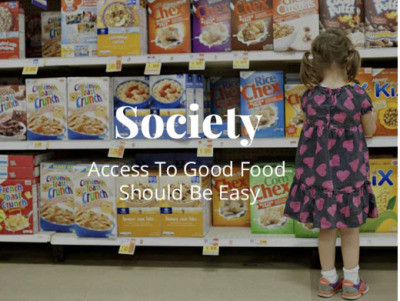Society - Access to Good Food Should Be Easy

Consider this, there are over 800 million people who live in a state of hunger. This figure is contrasted against the 700 million who are obese. 17% of the Children in America live with food scarcity. Many industries including agriculture have contributed to shortages of drinkable water. This is in an America where there is a water menu in high–end restaurants so that guests can choose the pure water of their choice.
Consider this, the modern food web means that local farmers lose their land and are forced to work on plantations that grow food for export rather than raise food for their own families and community.
Consider this, developed countries such as America have food desserts where the only foods available to urban populations are fast-foods and there is little or no access to fresh produce. Fast food, manufactured to sell at a cheap price is a criminal enterprise that results in disease and obesity among children and the poor.
1.2 million people in the UK are living in low-income areas where households struggle to buy affordable fresh fruit and vegetables, according to a new study.
For people living in a food desert this can mean having to dedicate a part of an already stretched budget toward transportation costs to purchase the food they need. It can mean having to carry their food shopping a long distance. This is a particular problem older people living in these nutritionally deprived areas.
It is likely people living in the food desserts who will pay a higher cost for their weekly food shopping and must shop in more expensive small convenience stores. These shops usually have a limited stock of good value fresh products.
Forty-one per cent of these households don’t have a car, making it even harder to get to a wide range of good value food stores. One in eight people surveyed for the report say that not being near a supermarket offering healthy food at low prices stops them eating more healthily. The situation in America is similar.
Nearly 39.5 million were living in low-income and low- access areas, according to the USDA’s most recent food access research report, published in 2017.
Within this group, researchers estimated that 19 million people — or 6.2% of the nation’s total population — had limited access to a supermarket or grocery store. This reflects the total neglect of the health of the next generation. It feeds the greed and arrogance of a food industry focused on profit above health, it is an important force in the creation of the epidemic of obesity and diabetes that is running wild in the affluent countries of the world.
WHAT YOU CAN DO
Significant changes in the food web can happen in response to consumer action. Most food in the food deserts are made by fast food outlets and snack food manufactures. Any support you give by purchasing food items from them promote the system. This includes green washed products such as “vegan” or “natural” items that show up on fast-food menus. A “vegan burger” in a fast-food outlet is simply a way of signalling change and not a sincere move to improve the healthy options. It is important to support community outreach that makes fruit, vegetables, and local organic foods available to a wider market.

